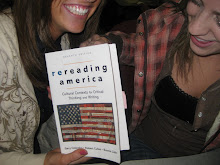CLICK ON THESE STEPS if your having a problem writing your paper! THEY HELP :)
1. CHOOSE A TOPICSTEP 2. FIND INFORMATIONSTEP 3. STATE YOUR THESISSTEP 4. MAKE A TENTATIVE OUTLINESTEP 5. ORGANIZE YOUR NOTESSTEP 6. WRITE YOUR FIRST DRAFTSTEP 7. REVISE YOUR OUTLINE AND DRAFT Checklist One Checklist TwoSTEP 8. TYPE FINAL PAPERALSO WE HAVE TO WRITE ANNOTATED BIBLIOGRAPHIE: what the heck!!! HAHA this MIGHT HELP OUT a lil bit ON EXCATLY WHAT IT IS!!!
An annotated bibliography is a list of citations to books, articles, and documents. Each citation is followed by a brief (usually about 150 words) descriptive and evaluative paragraph, the annotation. The purpose of the annotation is to inform the reader of the relevance, accuracy, and quality of the sources cited.
Creating an annotated bibliography calls for the application of a variety of intellectual skills: concise exposition, succinct analysis, and informed library research.
First, locate and record citations to books, periodicals, and documents that may contain useful information and ideas on your topic. Briefly examine and review the actual items. Then choose those works that provide a variety of perspectives on your topic.
Cite the book, article, or document using the appropriate style.
Here is a Sample i found... FOR A JOURNAL ARTICLE(ummm... Cornell University Library)
The following example uses the APA format for the journal citation. NOTE: APA requires double spacing within citations.
Waite, L. J., Goldschneider, F. K., & Witsberger, C. (1986). Nonfamily living and
the erosion of traditional family orientations among young adults. American Sociological Review, 51, 541-554.
The authors, researchers at the Rand Corporation and Brown University, use data from the National Longitudinal Surveys of Young Women and Young Men to test their hypothesis that nonfamily living by young adults alters their attitudes, values, plans, and expectations, moving them away from their belief in traditional sex roles. They find their hypothesis strongly supported in young females, while the effects were fewer in studies of young males. Increasing the time away from parents before marrying increased individualism, self-sufficiency, and changes in attitudes about families. In contrast, an earlier study by Williams cited below shows no significant gender differences in sex role attitudes as a result of nonfamily living


